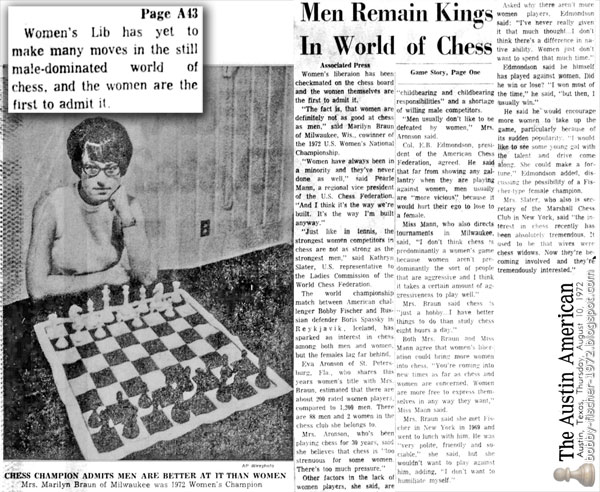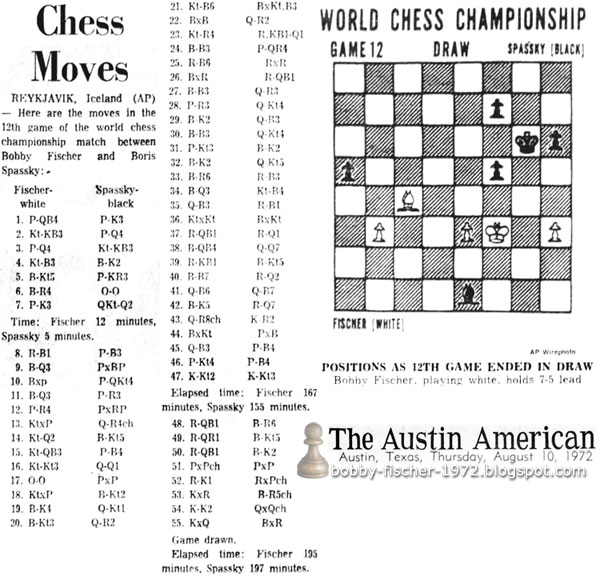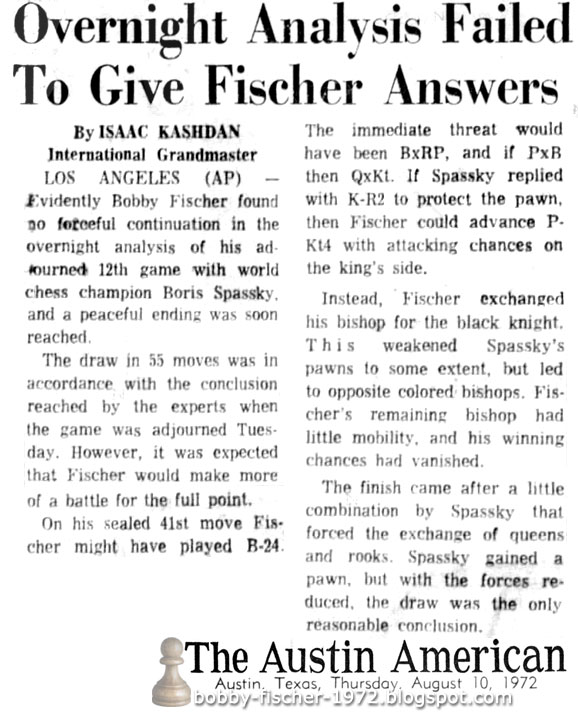The Austin American Austin, Texas Thursday, August 10, 1972 - Page 47 (★)
Men Remain Kings In World of Chess
Women's liberation has been checkmated on the chess board and the women themselves are the first to admit it.
“The fact is, that women are definitely not as good at chess as men,” said Marilyn Braun of Milwaukee, Wis., cowinner of the 1972 U.S. Women's National Championship.
“Women have always been in a minority and they've never done as well,” said Pearle Mann, a regional vice president of the U.S. Chess Federation. “And I think it's the way we're built. It's the way I'm built anyway.”
“Just like in tennis, the strongest women competitors in chess are not as strong as the strongest men,” said Kathryn Slater, U.S. representative to the Ladies Commission of the World Chess Federation.
The world championship match between American challenger Bobby Fischer and Russian defender Boris Spassky in Reykjavik, Iceland, has sparked an interest in chess among both men and women, but the females lag far behind.
Eva Aronson of St. Petersburg, Fla., who shares this years women's title with Mrs. Braun, estimated that there are about 200 rated women's players, compared to 1,200 men. There are 88 men and 2 women in the chess club she belongs to.
Mrs. Aronson, who's been playing chess for 30 years, said she believes that chess is “too strenuous for some women. There's too much pressure.”
Other factors in the lack of women players, she said, are “childbearing and childbearing responsibilities” and a shortage of willing male competitors.
“Men usually don't like to be defeated by women,” Mrs. Aronson said.
Col. E.B. Edmondson, president of the American Chess Federation, agreed. He said that far from showing any gallantry when they are playing against women, men usually are “more vicious” because it would hurt their ego to lose to a female.
Mrs. Mann, who also directs tournaments in Milwaukee, said “I don't think chess is predominantly a women's game because women aren't predominantly the sort of people that are aggressive and I think it takes a certain amount of aggressiveness to play well.”
Mrs. Braun said chess is “just a hobby…I have better things to do than study chess eight hours a day.”
Both Mrs. Braun and Miss Mann agree that women's liberation could bring more women into chess. “You're coming into new times as far as chess and women are concerned. Women are more free to express themselves in any way they want,” Miss Mann said.
Mrs. Braun said she met Fischer in New York in 1969 and went to lunch with him. He was “very polite, friendly and sociable,” she said, but she wouldn't want to play against him, adding, “I don't want to humiliate myself.”
Asked why there aren't more women players. Edmondson said: “I've never really given it that much thought…I don't think there's a different in native ability. Women just don't want to spend that much time.”
Edmondson said he himself has played against women. Did he win or lose? “I won most of the time,” he said, “but then, I usually win.”
He said he would encourage more women to take up the game, particularly because of its sudden popularity. “I would like to see some young gal with the talent and drive come along. She could make a fortune.” Edmondson added, discussing the possibility of a Fischer-type female champion.
Mrs. Slater, who also is secretary of the Marshall Chess Club in New York, said “the interest in chess recently “has been absolutely tremendous. It used to be that wives were chess widows. Now they're becoming involved and they're tremendously interested.”
The Austin American Austin, Texas Thursday, August 10, 1972 - Page 47 (★)
World Chess Championship: Chess Moves Game 12
Reykjavik, Iceland (AP)—Here are the moves in the 12th game of the world chess championship match between Bobby Fischer and Boris Spassky:
The Austin American, Austin, Texas Thursday, August 10, 1972 - Page 47
Overnight Analysis Failed To Give Fischer Answers
By Isaac Kashdan, International Grandmaster
Los Angeles (AP) — Evidently Bobby Fischer found no forceful continuation in the overnight analysis of his adjourned 12th game with world chess champion Boris Spassky, and a peaceful ending was soon reached.
The draw in 55 moves was in accordance with the conclusion reached by the experts when the game was adjourned Tuesday. However, it was expected that Fischer would make more of a battle for the full point.
On his sealed 41st move Fischer might have played B-24. The immediate threat would have been BxRP, and if PxB then QxKt. If Spassky replied with K-R2 to protect the pawn, then Fischer could advance P-Kt4 with attacking chances on the king's side.
Instead, Fischer exchanged his bishop for the black knight. This weakened Spassky's pawns to some extent, but led to opposite colored bishops. Fischer's remaining bishop had little mobility, and his winning chances had vanished.
The finish came after a little combination by Spassky that forced the exchange of queens and rooks. Spassky gained a pawn, but with the forces reduced, the draw was the only reasonable conclusion.


























